Victoria declared conservation win this week when officials provided positive news about a fluffy marsupial that had been assumed to be extinct in the wild. Fortunately for the eastern barred bandicoot, three decades of conservation efforts have resulted in its status being elevated to endanger in the Australian state, with the expectation that the population will stabilize in a more bandicoot-friendly habitat.
The historic occasion is made all the more significant by the fact that it is the first time Australia has been allowed to elevate an animal’s classification from “extinct in the wild” to “endangered.” In a statement released on Wednesday, Victoria’s Environment Minister Lily D’Ambrosio stated, “We are excited to announce the shift in conservation status for the Eastern Barred Bandicoot from extinct in the wild to endanger.” “This is a historic first for Australia.”
Bandicoots were previously a common sight on the grassy plains of southwest Victoria, but they were nearly extinct due to mainland foxes and habitat loss. Just outside of Hamilton, the last wild group clung to life, numbering roughly 150 animals. They have, however, grown to an estimated 1,500 with the help of conservation biologists, volunteers, and dogs. Conservationists committed to conserving the rapidly dwindling eastern barred bandicoot population in the 1980s, and the fight for the species’ survival began.
The project received millions of dollars to fund captive breeding procedures in order to create a genetically diversified reserve population outside of the wild. At Woodlands Historic Park, Hamilton Community Parklands, Mt Rothwell, and Tiverton, teams worked to improve the living conditions for these adorable but evidently tasty prey creatures, establishing four predator-free locations where wild bandicoots may dwell without fear of becoming dinner. In Skipton and Dunkeld, dogs offered a paw to the good fight, with Zoos Victoria’s Guardian Dogs patrolling the perimeter to keep foxes at bay.
Some fortunate bandicoots even took a vacation to the fox-free islands of Phillip, Churchill, and French, where bandicoots are said to be thriving. All of these sites together have produced approximately 1,500 animals, allowing Australia to reclassify the species classification.
















